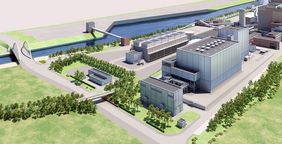
STEAG building for the future of energy
A new and highly efficient combined cycle gas turbine (CCGT) power plant in Herne, Germany, will secure the supply of electricity and heat in the heart of the Ruhr area in the future. The new power plant will use the principle of combined heat and power generation (CHP), is therefore particularly resource-friendly, and in the future will replace the hard coal-fired unit 4 of STEAG’s Herne Power Plant. The district government in Arnsberg has now approved the first construction phase.
Work on the foundation of the new power plant is currently underway at the Hertener Strasse site. A total of 777 concrete piles, each 15 meters deep, have been driven into the ground to support the foundation blocks. These will in future support turbine and generator, which in a combined process can generate 608 megawatts of electricity and 400 megawatts of heat. By extracting the heat, the overall fuel efficiency of the natural gas used increases to 85 percent, making the future power plant one of the most efficient and eco-friendly CCGT power plants worldwide.
CCGT Herne driving the energy transition forward
STEAG and Siemens will be investing a mid-three-digit million amount in the project. With the Herne CCGT Power Plant, they are actively contributing to the success of the energy transition, as the politically agreed phase-out of nuclear and coal-fired power generation necessitates investments in power plant capacities that can be used flexibly. “The new Herne CCGT Power Plant ideally meets the requirements for a forward-looking energy supply: It guarantees security of supply, is economical and efficient, and thus environmentally compatible,” says Joachim Rumstadt, Chairman of the Board of Management of STEAG GmbH. “After all, our motto is: ‘Securing safe and reliable energy supply. Now and in the future.’”
But the Herne CCGT Power Plant is not only a showcase project in terms of energy efficiency. It also enables STEAG to once again demonstrate its comprehensive expertise in the field of energy generation. Developing and implementing complex engineering projects is one of STEAG’s acknowledged core competencies.
Maintaining CHP investment security
But political support is needed if there are to be further eco-friendly CHP projects in Germany beyond 2022. “The Federal Government must reach an agreement with the EU Commission as soon as possible on financial support for projects of this kind based on the CHP Act remaining compatible with European state aid law,” remarks Joachim Rumstadt in pressing for speedy clarification. “Until that comes about, all new projects for the period beyond 2022 will be left hanging in mid-air.”
The Herne CCGT Power Plant project partners are determined to bring the new power plant into continuous commercial operation by the end of 2022 in order to avoid any risk in terms of CHP subsidies.
Regional significance
The project is also of great significance for Herne as a town and business center. “It is a statement for industrial employment opportunities and climate protection in Herne. In future, one of the most modern and eco-friendly combined cycle power plants in Europe will be supplying much of the Ruhr area with climate-friendly district heating. In Herne, STEAG’s employees are playing a decisive role in shaping the energy transition for Germany,” Dr. Frank Dudda, Mayor of Herne, points out.
STEAG has traditional links with Herne as a location, and is for instance currently building a modern training center for industrial trainees focusing on electrical and service engineering in Herne’s Forellstrasse. “Both projects – the CCGT Power Plant and the training center – are groundbreaking investments in the future of the Ruhr area as a business location and STEAG as a company,” Joachim Rumstadt emphasizes.
